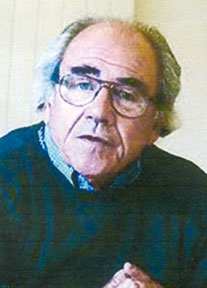|
Jean Baudrillard:
The man of the media
by R Premkumar
Ideas in the modern world are created and changed by the media. It is
said the world has been shrunk into a small village. Scientific and
technological developments have played a significant role in creating
ideas. Michel Foucault has stressed the important relationship between
power and knowledge. Baudrillad reflects on the media created world.
Searching for 'reality' is the goal of philosophy. Baudrillard also
searches for reality in the media creating world and coined the term
'simulacrum' which literally means 'copy'. However, it implies 'hyper
reality' or 'media reality'.He never fails to unearth the process of the
interpretation involved in the meanings and values of the
socio-political life by the media, especially in the electronic media.
 |
|
Jean Baudrillard |
Baudrillard says that needs are created. In this process, the media
and culture play a vital role. His analysis revolves around three
aspects; production, consumption and media. In the contemporary society,
we do not perceive reality per se, but we perceive the reality created
by media and culture. This is the truth that Baudrillard arrived at in
'Hyper reality'.
Baudrillard says in contemporary society, people experience. They
seem to be realities, but they are not. This type of reality is partly
created by the media and culture. Baudrillard says 'hyper reality' is
found in the electronic era.The hyper reality determines the existence,
values and meaning of our lives. We interpret the value of life in terms
of hyper reality. We perceive and interpret every event in our life with
some ideas acquired from the media or hyper reality.
Baudrillard calls this process 'precession of simulacra'.
Contemporary media such as the television, cinema, newspapers and the
Internet, create more commercially oriented needs in the minds of
contemporary human beings.From a historical perspective he explains our
illusion of reality. Once upon a time, there was a huge empire and the
map drawn on it was exact. In the course of time, the empire collapsed
and shrank into a small area in reality.
But the original image of the empire continues in the people's minds.
Baudrillard insists that in this way we acquire images of many things
and events in the media dominating world. He contends, in the
contemporary world we never touch or feel the reality of things or
events, but only feel or perceive a false image of reality.
Interpretation
Ideas are created in the minds of people. Ideas conceal the true
nature of things or events. Thus, all our understandings and
interpretations of life and the world are to a large extent creations of
the media and their agents.
The article titled 'Gulf war did not take place' was written by
Baudrillard in 1990 and published in the Paris dailies.
But the title shocked the public. However, one cannot deny there is a
substantial truth in the article. Baudrillard said news is not equal to
facts. He said matters published in the media make our life meaningful.
If there is no media, our life will become empty.
In the hyper real world, Baudrillard says signs and their meanings
are changing forever and meanings of events and cultural elements are
infinite in nature. He shows that the existence of binary opposites
disappears and everything becomes uncertain.
The existence of binary concepts; beauty and ugliness in the fashion
world, the left and the right in politics, the true and the false in the
media, nature and culture-all these opposing concepts become
interchangeable in the hyper real world.
In the hyper reality dominating world, external things and events are
more significant than the inner activities of human beings. As a result,
external events influence and control the inner activities of human
beings. Baudrillard says hyper reality seduces the minds of the people.
He was amazed that seduction of hyper reality is enigmatic in its
multifarious dimensions and consequences. Many people are mostly
influenced by hyper real and believe it is real. They make their life on
the basis of hyper reality and become victims of illusion.
Many ideas of Baudrillard on the hyper real world and the people who
live in it are true, but we cannot accept the statement that people do
not realise the difference between the real world and the imaginary
world.
In fact, people know the difference, but Baudrillad does not know
that people always do not like to live in the real world and sometimes
they like to go beyond it. They wish to live in dreams or in an
imaginary world created by the media. The hyper real appears to them as
an illusion. |


